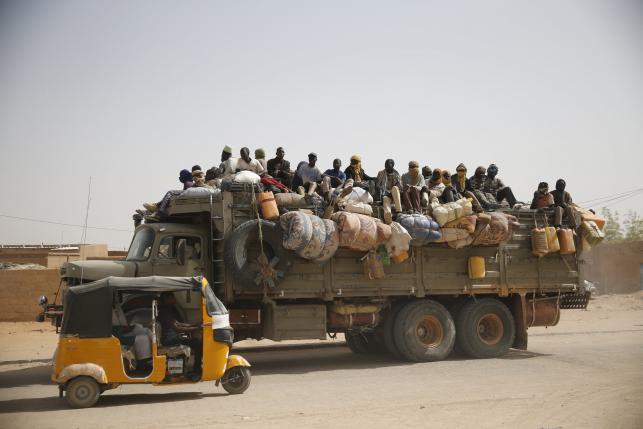Long-serving FIFA President Sepp Blatter was set to be easily reelected to his post on Friday. Despite numerous accusations that the soccer governing body is rife with financial maleficence and bribery and despite its increasingly disastrous attempt to stage World Cup 2022 in Qatar, Blatter was functionally running unopposed.
The general feeling of soccer fans was one of resignation: The sport has always been corrupt and ever would be. John Oliver probably said it best:
There didn’t seem to be much hope for heroes in this scenario, just more of the same. And then something unexpected happened, from quite possibly the last nation anyone expected to get involved. Acting in concert with the U.S. Justice Department, the Swiss arrested seven top FIFA officials at a fancy hotel in Zurich, home to FIFA, where they were staying before the vote to reappoint Blatter to his fifth term.
In announcing the indictment of the seven, plus two other soccer officials and five sports marketing executives, United States Attorney General Loretta Lynch took the podium like Elliot Ness and announced that there was a new sheriff in town.
The announcement wasn’t completely out of the blue. Rumors were circulating in the past few weeks that Blatter would not step foot in the U.S. for fear of questioning by the FBI, and while no one doubted that there was truth to the story, there was also no expectation that anything concrete would come of it. Certainly no one expected the full frontal assault on FIFA that Lynch seemed to point to at her press conference in Brooklyn, N.Y., today.
To be clear, no charges have been filed against Blatter, and it is likely that he will still win Friday’s election. But the “no comments” Lynch issued in response to questions about investigating the FIFA president and the assignment of World Cup’s 2018 and 2022 venues seemed to scream out: “Watch This Space!”
Also, it is worth noting that this is no Deflategate we are looking at here, and the insane 24-year investigation that led to this moment will surely make a fascinating movie one day. For a full rundown, The Guardian has a solid explainer.
It is not coincidental that the methods used to conduct the FIFA investigation were similar to those used to take down international crime or terrorism rings. In fact, it was key provisions of the much maligned Patriot Act that enabled the investigation to progress.
 And lest you think that the comparison to Al Capone is unfair, just a reminder that 1,200 migrant workers have already died in the appalling conditions of Qatar’s World Cup efforts. Estimates are that this number will reach 4,000 before all is said and done — roughly 68 people killed per game to be played there, and that’s not to mention the thousands of others living a human rights nightmare.
And lest you think that the comparison to Al Capone is unfair, just a reminder that 1,200 migrant workers have already died in the appalling conditions of Qatar’s World Cup efforts. Estimates are that this number will reach 4,000 before all is said and done — roughly 68 people killed per game to be played there, and that’s not to mention the thousands of others living a human rights nightmare.
Blatter’s less severe but still appalling missteps include advising gay and lesbian World Cup fans visiting Qatar, where homosexual acts are illegal, to simply abstain from any “activity” while they are there (he also suggested women’s soccer could gain a wider audience with more nudity).
As Lynch made quite clear, the charges lodged today are just the beginning, but several questions still remain. Chief among them: Why did the U.S, a nation still largely indifferent to soccer, get involved with what is perceived as a European problem?
Well, there are multiple possible answers, including the fascinating story of Chuck Blazer, a maverick U.S. millionaire and former high-ranking FIFA executive who has done more to bring popularity to the sport in America than anyone this side of portrait of the man last year in the aftermath of the previous World Cup.)
It was Blazer’s gargantuan unpaid tax bill that seems to have been the powder keg of the investigation and the motivating factor that led to the 70-year-old man wearing a wire for the FBI. That, in turn, led to the charges that have been issued today against various figures within the sport, and an unnamed American sports apparel company in regards to its sponsorship of the Brazilian national team. Any guesses?
Beyond the implications for Blatter and the rest of FIFA, there is also the question of what will become of the next two World Cups. The awarding of these tournaments to Russia and Qatar has been mired in controversy, with Blatter stating that it was his desire to bring the World Cup to new parts of the world and break up the Western monopoly. Critics called that stance just an egalitarian disguise to cover up instances of bribery and corruption, as Middle Eastern oil money almost certainly played a part in the bid for 2022.
The objections to 2018 in Russia are largely based on various concerns about Vladimir Putin and Russia’s attitude toward human rights, but it seems unlikely, barring major revelations, that Moscow will be replaced as host of the World Cup. In fact, it’s not entirely unthinkable that fear of losing the cup is one of the few things keeping Putin from even more aggressive behavior. (It is worth noting that the Russian response to the U.S. charges has been to decry America’s jurisdictional overreach.)
But while 2018 is problematic, 2022 is unquestionably a train wreck. On top of the simply appalling state of the Nepalese migrant workers, there are many large pragmatic concerns for the Qatari World Cup, including the simple logistics of playing the sport in the punishing weather and the fact that the stadiums where the games are to be played do not exist yet.
Additionally, sponsors have begun to get cold feet and no wonder. They are being asked to sponsor a massive event that is set to take place in a troublesome region of the world for many travelers (although Qatar ranks high on the list of safest places to visit), in a culture that discourages drinking and sex. Besides that, holding the World Cup in Qatar will massively disrupt the schedule of almost every domestic league in the world because weather concerns mean the games would have to be played in December. Imagine the total meltdown Americans would undergo if, say, they were told that the NFL would be holding the Super Bowl in May due to some event in Qatar. The uproar would be deafening. Yet that is the decision that every major soccer league in the world is being forced to accept to accommodate the 2022 Cup.
Blatter stands by his decision, trying to appear as the humanitarian who brought the first World Cups to Africa and the Middle East, and these would be laudable goals were it not so obviously a cover. But it is hardly FIFA’s only humanitarian ruse. Ridiculously, FIFA is listed as a charity. This is despite taking $4.4 billion in revenue, with an annual profit of $2 billion.
Football fans have dealt with the corruption of this organization for so long that some believe change will never come. And it may be that this investigation ends with the indictments issued today, that Blatter retains his throne and that both World Cups proceed as (poorly) planned.
But for the first time in a long while, there is a real reason to hope for meaningful change.
As Lynch said: “This is just the beginning.”
financial times














